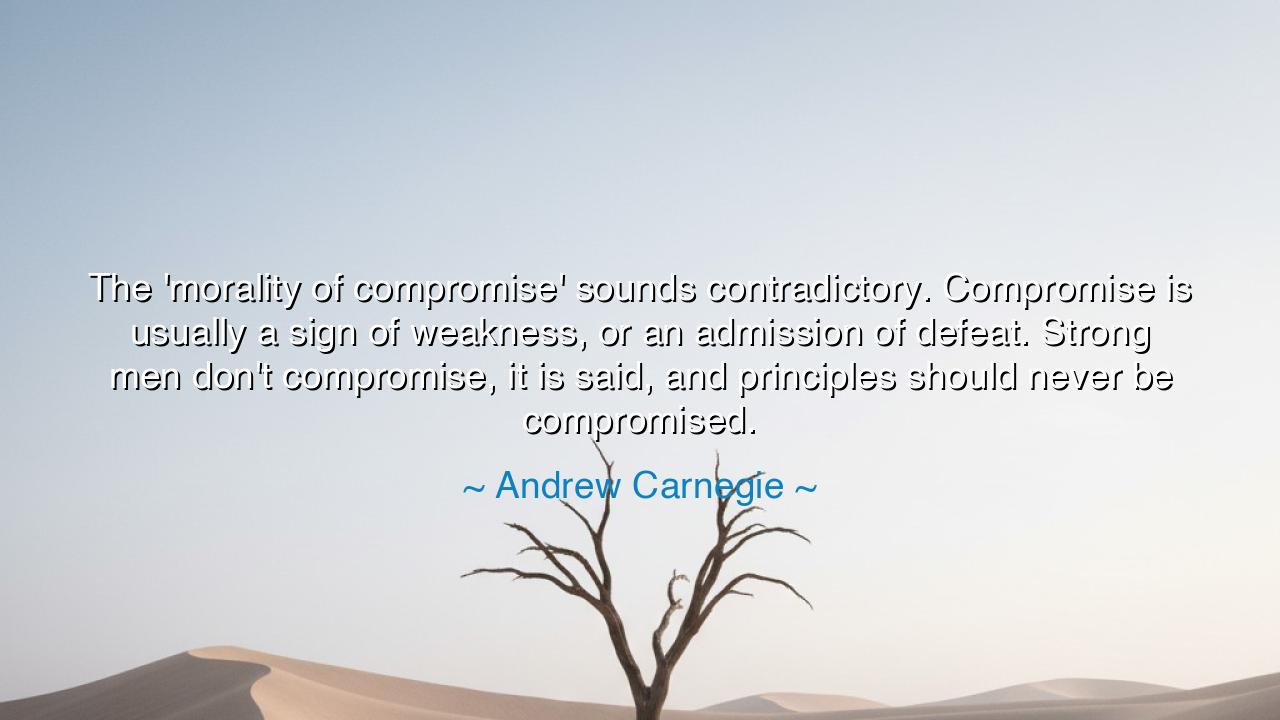
The 'morality of compromise' sounds contradictory. Compromise is
The 'morality of compromise' sounds contradictory. Compromise is usually a sign of weakness, or an admission of defeat. Strong men don't compromise, it is said, and principles should never be compromised.






Hear the words of Andrew Carnegie, titan of industry and philosopher of power, who declared: “The ‘morality of compromise’ sounds contradictory. Compromise is usually a sign of weakness, or an admission of defeat. Strong men don’t compromise, it is said, and principles should never be compromised.” In this saying lies a tension as old as human conflict—the clash between unyielding principle and the necessity of peace. Carnegie, a man who lived through fierce labor struggles, bitter rivalries, and the forging of empires, knew that compromise was seen by many as betrayal, and yet he also knew it could be the highest wisdom.
For what is compromise? To the proud, it appears as weakness; to the stubborn, it seems like surrender. Yet history reveals that compromise is not always cowardice—it can be the art of survival, the bridge that prevents destruction, the path by which warring parties find common ground. Carnegie’s words force us to wrestle with the paradox: how can compromise be both despised and necessary, both the mark of weakness and the tool of the wise?
Consider the story of the United States Constitution. In the summer of 1787, the new nation stood at the brink of collapse. The states could not agree—large against small, free against slave, federal against local. Tempers burned, and unity seemed impossible. Yet through a series of compromises—the Great Compromise, the Three-Fifths Compromise, and others—a fragile but enduring framework was born. Was this weakness? Perhaps. Was it also survival? Without it, the nation may have fractured before it even began. The morality of compromise, then, is not about surrendering principles blindly, but about weighing which principles to hold and which to bend, for the sake of the greater whole.
And yet, Carnegie warns us: principles should never be compromised. Here lies the heart of the teaching. Compromise in method may be wise; compromise in truth may be ruin. To find peace by sacrificing justice is not noble, but dangerous. To preserve unity by denying human dignity is not strength, but corruption. Thus, compromise must always be measured: it can end conflict, but it can also perpetuate injustice if misused. The morality of compromise is a narrow road between cowardice and wisdom.
History gives us another lesson in Abraham Lincoln. In his early years, he compromised often to hold the fragile Union together. Yet there came a time when compromise could no longer stand—the issue of slavery demanded a final reckoning. In that moment, Lincoln stood firm, unwilling to trade justice for peace. His life, and the war that followed, proved Carnegie’s warning: not all compromises are moral. There are times when principle must remain unmoved, even if the cost is blood and fire.
Thus we learn: the morality of compromise depends not on the act itself, but on what is being yielded. To compromise on pride, on ego, on preference—this may be wisdom. To compromise on truth, on justice, on the dignity of human life—this is corruption. Strength is not found in rigidity alone, but in the discernment to know when to bend and when to stand unbroken.
The lesson, O seeker, is this: do not despise compromise, but do not glorify it blindly. Ask always: what am I protecting, and what am I yielding? If you yield your ego to preserve peace, you are wise. If you yield your principle to avoid conflict, you are lost. True strength lies not in refusing all compromise, nor in embracing all compromise, but in discerning which path leads to the greater good.
So let Carnegie’s words echo as a challenge to every generation: compromise is not always weakness, nor is it always strength. It is a tool, dangerous in the hands of the foolish, but powerful in the hands of the wise. Learn when to wield it, and your life will bear the fruit of both peace and principle.






AAdministratorAdministrator
Welcome, honored guests. Please leave a comment, we will respond soon